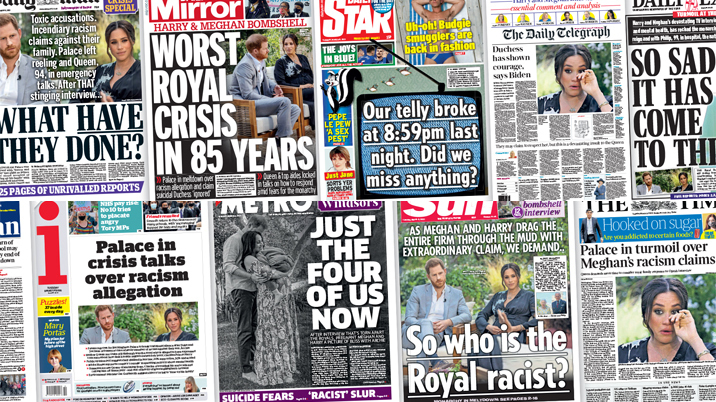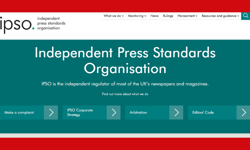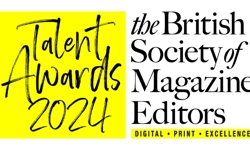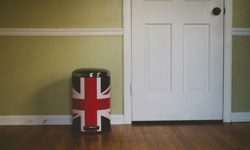
Will the sacred edifice of press freedom come crashing down if newspapers are told they can’t print a woman’s deeply personal letter to her father?
Is the free press, and with it democracy, threatened if a clutch of protesters stop a couple of newspapers leaving the print plant for one night?
Does a television presenter leaving his job after 41,000 people complain about his comments demonstrate that “cancel culture” is out of control?
To most people outside the media – and particularly those who have suffered at the hands of our newspapers – these are no-brainer questions. Of course not, what are you thinking of? Get a grip.
But we, inside, see wedges everywhere and our eyes are fine-tuned to spot their thin ends. At the thick end are despotic regimes around the world and the fact that the first job of anyone plotting a coup is to grab control of the media.
We’re very good at that. Likening ourselves (and our determination to cling to our freedom to write rude things about royals and celebrities) to journalists imprisoned and murdered for questioning corruption and thuggery abroad. Perhaps our constant claims of “holding the powerful to account” would ring less hollow if our newspapers had been as assiduous in examining the £37bn test-and-trace programme as they have in dissecting the Duchess of Sussex’s every word and deed.
We demand the freedom to do as we wish and to have our golden prose disseminated in every corner of the land – shrieking in horror when Extinction Rebellion stop some papers reaching their audience. Yet we are not only delighted when the government starts to legislate to ban such demos that might harm us, but unperturbed that it also aims to outlaw any peaceful protest that could be deemed to “disrupt” anything. So much for championing freedom.
Press freedom is precious; we are right to cherish it. But do we have to be quite so sanctimonious and double down every time we are called out for our cruelty? Could we not, once in a while, recognise that we can and do overstep the mark, acknowledge that our actions affect real people’s real lives – just say “sorry” and rein back a bit – without having to be dragged, kicking and screaming, through the courts or the regulator’s complaints system?
No. We keep on painting ourselves as the victims, bad-mouthing our BBC, social media and internet rivals at every opportunity, smearing critics as “anti-democratic” and “woke snowflakes”, posing as the reader’s friend when all we really want are their eyes and money. We seem incapable of seeing ourselves as others see us. And that will be the ruin of us.
We seem incapable of seeing ourselves as others see us. And that will be the ruin of us.
Selective reporting
In May last year, Mr Justice Warby struck out some of the Duchess of Sussex’s complaints against the Mail on Sunday at the first hurdle. “Humiliated!” its daily sister cheered over pages 2 and 3, hailing its great victory. In an “excoriating” ruling, the judge had “branded” parts of her case “wholly inadequate, impermissibly vague and irrelevant”. She would have to pay hundreds of thousands in costs, the paper said. Others, such as the Sun with its “Throne out!” heading, were equally ecstatic about the ruling. The general feeling was that Duchess had been badly advised and should settle and walk away.
But she didn’t. And in February, the same judge who had ruled that some claims were so weak that no hearing was required to dismiss them decided that her central complaint was so strong that no trial was needed to find in her favour. Naturally, the Mail pushed the story back on to a left-hander with a much smaller heading – as it had done a week earlier when the Mail on Sunday paid “substantial” libel damages for suggesting that Price Harry had turned his back on the Royal Marines.
The Times put the Meghan victory at the top of page one, but raised concerns in an inside analysis that the “free press was being hamstrung by a judicial elite with little or no public debate”. Indeed, the paper was so exercised by this that it ran a leader the next day on the “chilling effect” on press freedom of “judge-made privacy laws”. The risk was that people in power would be able to control press coverage through a “carefully managed feed of public relations-curated information”. Because of course no one does that now. Especially no one in Downing Street.
That editorial drew on a follow-up news story in that day’s paper which also referred to “judge-made privacy laws” and quoted a media lawyer and Ian Murray of the Society of Editors (more of him later), but no counter-voice to defend the ruling or suggest that there might be any cause for concern in the way newspapers sometimes behave.
The paper may have a valid point. If there are to be privacy laws, perhaps they should be enacted by parliament, rather than rely on judges’ interpretation of the human rights convention. We do need the press to hold the powerful to account. Just as The Times did a week later, when it splashed on “Harry and Meghan hit back after loss of their royal roles”, relegating to a single paragraph at the foot of page nine the court ruling that Matt Hancock had acted unlawfully in not publishing details of billions of pounds worth of PPE contracts.
As we know, it didn’t stop there. The Harry and Meghan circus just kept rolling on, with the Instagram pregnancy announcement, the James Corden bus-top chat, historic allegations of bullying and the wearing of “blood diamonds” two years ago that conveniently surfaced – again in The Times – the week before the Oprah Winfrey interview went out.
Then there were the claims that the couple were “overshadowing” the Queen’s broadcast on vaccines (which no one knew about when the interview was recorded two weeks earlier) and “pleas” to them to halt the airing of the interview because the Duke of Edinburgh was in hospital. As though they had any control over when it was shown once it was in the can and scheduled. Imagine the response of a tabloid editor with a stonking exclusive if the subject rang and said, “Please don’t print it, my Grandad’s sick.”
The recurring theme was that the couple were publicity-shy attention seekers with an appalling sense of timing – and that nobody was interested in them anyway. Which is why the tabloids ran splash after splash, spread after spread. There was so much to say in the run-up to the screening of the full interview that most didn’t have space to notice that, in a further judgment on Meghan’s claim that printing her letter to her dad was a breach of copyright, the Mail on Sunday had been ordered to publish a front-page apology in a type face no smaller than that used for the original story.
Meghan did indeed dominate the top half of the next day’s MoS – a picture and a quote from someone in the Palace saying the interview was a “side show” that would be “lost in the mists of time”. There were a further twelve pages on the “side show” – including one on the Diana interview 25 years ago that doesn’t seem to have been lost in the mists of time – as well as a leader and a Sarah Vine swipe, but not a sentence about the latest High Court ruling. Nor was their room when it had its first bash after the event with an all-royal front page and “14 pages of unrivalled insight” on the “toxic aftermath” of the interview. Much of that was defensive, accusing others of faking headlines and insisting that, far from being racist, the paper had fallen “head over heels in love” with Meghan when she first appeared.
The Sundays, of course, had all had time to collect their thoughts. The Palace, whose staff have dripped poison about every incomer for decades, wisely held its counsel for a day or so to let the accusations sink in and gauge reaction before coming out with a 61-word statement that said, “recollections may vary”, but did at least acknowledge the import of the racism charge.
It would be helpful if we could all see these events as the wake-up call they should be.
Wrong-footed?
But daily newspapers and broadcasters don’t have time to digest stuff. They have to get the next issue or the next show out. And they were wrong-footed. It was as though they had assumed the trailers were full of the tastiest bits, not mere crumbs from a rich cake with a stunning secret ingredient. They were now in the position of having to maintain their disdain for Meghan while saying all the righteous things about race and mental health – through 27 pages in the case of the Mail.
It was too much for Piers Morgan and cost him his GMB gig (although what’s the betting he’ll turn up on GB News or the News UK channel?) and it was too much for Ian Murray, whose blundering hasty response to the Sussexes’ claim of Press bigotry led to his resignation from the Society of Editors.
Murray got it worryingly wrong in his combative defence of the press’s “proud history” in which he declared: “The UK media is not bigoted and will not be swayed from its vital role holding the rich and powerful to account following the attack on the press by the Duke and Duchess of Sussex.” Hundreds of journalists responded to a Press Gazette poll citing their own experiences of in-office discrimination; four editors publicly distanced themselves from the statement, BAME columnists wrote about the continuing lack of diversity and racism in newsrooms, 250 journalists of colour from across the media spectrum signed an open letter denouncing as “laughable” the “blanket refusal” to accept that there was any bigotry in the British press, saying it showed an industry in denial, and the woman who had been due to host the society’s flagship Press Awards backed out. Then to make matters worse, Murray repeatedly talked over Victoria Derbyshire in a BBC interview.
Murray has many friends in the industry who will be saddened by his inglorious departure. But it would be helpful if we could all see these events as the wake-up call they should be. Our newspapers are still largely owned and run by white men who might charitably be described as “middle aged” (some could claim their state pension) and – for all the fulminating about the “metropolitan liberal elite” not understanding ordinary people – they seem alarmingly out of touch with the real world.
“It’s a generational thing,” Janice Turner wrote of attitudes towards Meghan – a verdict backed up by a poll after the Oprah interview, in which under-40s were almost all on the Duchess’s side, while over-65s were the most sceptical.
Given the weight of coverage of the Sussexes – more than 300 overwhelmingly negative pages over the three weeks before and after the interview – perhaps papers struggling for survival might consider which audience is more likely to secure their future and take the opportunity for a bit of self-reflection.
Being a little kinder will not destroy the free press. But being unremittingly belligerent might do just that.
Perhaps papers struggling for survival might consider which audience is more likely to secure their future.
This article was first published in InPublishing magazine. If you would like to be added to the free mailing list, please register here.












